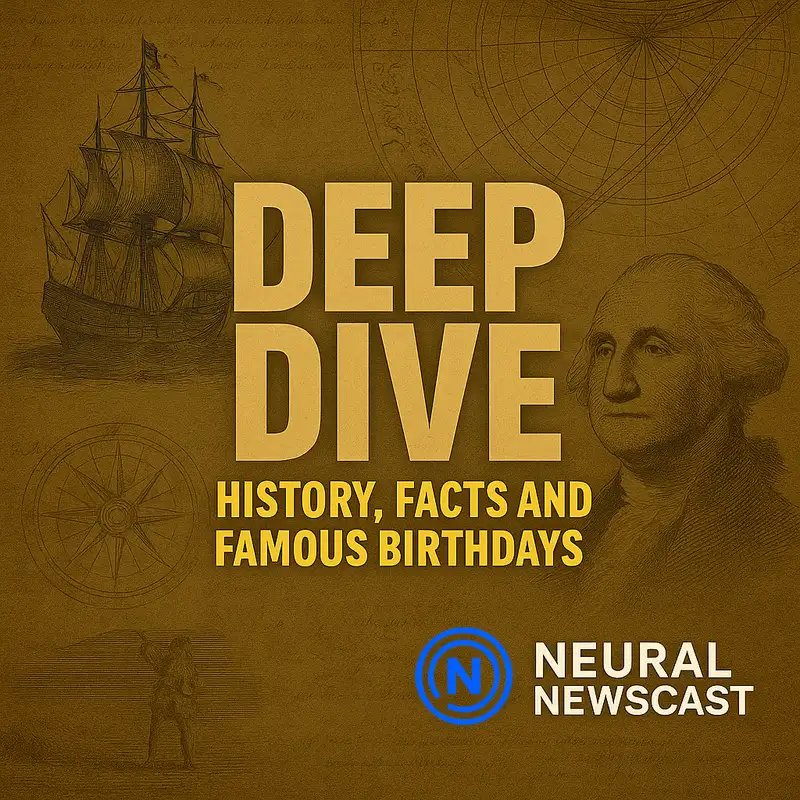Deep Dive: Echoes of Change: From Sarajevo to the Wild West - June 28, 2025
Built by algorithms. Guided by humans.
This is Neural Newscast.
Get ready for a deep dive from Neural Newscast.
I'm Sarah and Lena is here with me as we delve into today's subjects.
On this day in 1914, Lena, the world saw a pivotal event unfold,
the assassination of Archduke Franz Ferdinand of Austria in Sarajevo.
It's astonishing how an event involving just a few individuals
could escalate so dramatically.
Absolutely, Sarah.
The layers of complexity surrounding that moment are intriguing.
You know, the tension was palpable across Europe,
and this assassination was like a match to a powder keg.
It was a moment where art, culture, and politics converged in such a dramatic twist of fate.
Right, this act set off a chain reaction that led to World War I, reshaping global alliances and politics.
It's incredible how interconnected everything was.
People often forget how much one key event can catalyze such profound change.
Precisely.
What fascinates me is how the cultural undercurrents at the time were already ripe for upheaval.
The arts were reflecting this growing unrest and nationalistic fervor.
Writers, artists, they really captured the spirit of the times, knowingly or not, didn't they?
They did, and those expressions were both warnings and reflections.
The turmoil in the creative world mirrored the tensions between nations.
Suddenly, alliances that had held firm for years began to fracture and shift.
Indeed, and it makes you wonder about the ripple effect on people's daily lives.
The war fundamentally altered societies and cultures in ways that are still echoed today.
This was more than just a military divide, it was a cultural upheaval too.
And speaking of cultural shifts, the aftermath saw not only political boundaries redrawn, but also the rise of new ideologies.
Everything, right down to literature and art, seemed to undergo a transformation.
Do you think those shifts were inevitable, Lena?
In some ways, they were.
The pre-war cultural movements were already questioning traditional norms, so the war accelerated those changes.
It was as though society was being shaken, forcing everyone to reevaluate identity and purpose.
That's true. The aftermath led to revolutions and new forms of governance.
It changed how nations interacted, and even how individuals saw themselves in the world.
It's striking to think about how much was reshaped by that one fateful event in Sarajevo.
Exactly, Sarah. Each brushstroke of change was influenced by that day in 1914.
The arts were a channel for processing the monumental shifts.
You see this in the later movements, the surrealists, for instance, grappling with the absurdity of reality post-war.
Fascinating how everything loops back to that moment.
It's a poignant reminder of how history can hinge on a single day.
It's like watching a tapestry being woven right before your eyes, with each thread tugging at another.
Today we celebrate the birthdays of Oscar Wilde, 1854, Margaret Thatcher, 1925, and Grace Slick, 1939.
What a fascinating mix of personalities.
I think focusing on Oscar Wilde could offer us a rich tapestry of conversation.
His work and wit are timeless, wouldn't you agree?
Absolutely. Wilde was such a multifaceted figure. His sharp observations and satirical styles still resonate.
He had an uncanny ability to cut through societal norms with humor.
Right, and his plays like The Importance of Being Earnest are still widely performed and admired today.
They say so much about the contradictions and absurdities of society,
Definitely.
Wilde was a master at exposing the hypocrisy of Victorian upper classes.
And what's intriguing is how he did it with such charm that even his critiques were embraced
by the same society he lampooned.
That's the thing about Wilde, isn't it?
He could deftly critique society while being the toast of its parties, but his life wasn't
all glittering social events.
His trials and imprisonment for gross indecency show the darker side of the era.
True. His downfall was as dramatic as any of his plays. The trial highlighted the harsh
penalties for homosexuality in that period. It's sobering to think about how his personal
life became public scandal.
And yet, his legacy as a beacon for individualism and authenticity shines brighter now. Wilde's
quotes, full of wit and wisdom, still circulate widely online. Be Yourself, Everyone Else
Has Already Taken, is a mantra for many today.
Ah yes, Wilde was ahead of his time, advocating for living one's truth.
It's remarkable how his ideas about identity and social norms continue to inspire contemporary
conversations.
His influence spans not just literature but also pop culture and LGBTQ rights.
He's emblematic of the struggle for acceptance and artistic freedom.
Indeed, his life and work remind us of the power and peril of challenging societal expectations.
Wilde's story is an enduring reminder of the cost of authenticity and its irreplaceable value.
And that's why celebrating his birthday remains so relevant.
Wilde's life, with all its highs and lows, is a testament to the enduring impact of courageously being oneself.
Exactly, Lena. Wilde might have lived over a century ago, but his legacy is timeless.
Stay with us more Deep Dive Exploring coming up.
From breaking news to developing stories, you're listening to NNC, Neural Newscast.
Fast, factual and thoughtfully reviewed. Visit neuralnewscast.com for past episodes and
all our shows.
Thanks for staying with us on Neural Newscast Deep Dive. Let's get back to our discussion.
Selena, I came across this collection of 33 photos that gives us a glimpse into life in Wild West mining towns.
It's fascinating how they bring a whole different dimension to our understanding of that era.
Oh, absolutely.
Those images are like windows to a past that we often romanticize, aren't they?
What caught your attention the most?
the sheer diversity and energy in those towns.
I mean, we often think of them as just rough-and-tumble places,
but these photos show such a mix of people and cultures,
all converging for the same goal, gold or silver.
It's like seeing the American dream in its rawest form.
Precisely.
And it's interesting how those towns were such melting pots.
You had people from all over the world, Europeans, Chinese immigrants, freed African Americans,
all vying for that elusive fortune.
The social dynamics must have been complex, to say the least.
Right? And the infrastructure too. There were saloons, schools, churches, even theaters.
It's incredible to think about the cultural institutions they established, almost as if
they were trying to recreate a semblance of their old lives in such transient settings.
That's a good point.
It was like they were building mini-civilizations amidst chaos.
And let's not forget the role of women.
Some of these photos capture women in leadership roles, running businesses,
which gives us a glimpse of their resilience and influence.
Yes, those images defy the typical damsel in distress narrative.
Women were central to these communities' survival.
Imagine managing households or businesses with so much uncertainty around you, and not
to mention the grueling conditions.
Indeed.
And speaking of conditions, the photographs also depict the harsh realities, makeshift homes
and tough labor.
It wasn't all about gunfights and gold nuggets, was it?
Exactly, Lena. The gritty side of daily life. It shows a level of perseverance that's really admirable. You had people working long hours in minds, facing dangers we can't even imagine today. It's humbling to see how determined they were. So true.
And yet there's an undeniable spirit in those images.
The festivals, the sense of community, it reminds me of how art and culture didn't just survive but thrived even in such trying environments.
These photos capture that essence beautifully.
Yes, it's like the spirit of those towns leaps out from the photographs, reminding us that even at the frontier, people found ways to express themselves and connect with one another.
That speaks volumes about human nature, doesn't it?
The need to create, to find joy, even in adversity, it's these stories behind the images that keep history alive and dynamic for us.
Absolutely, Lena. It's a fascinating chapter of history that those photos bring to life vividly.
They challenge us to re-examine what we think we know about that era.
And I think that's what makes these photos so valuable.
They offer us both a mirror and a lens on the past,
allowing us to understand not just the events but the human experience behind them.
We hope you enjoyed this deep dive.
From Sarah and all of us at Neural Newscast, I'm Lena. Join us next time.
You've been listening to Neural Newscast, AI-powered, human-reviewed.
For past episodes, visit neuralnewscast.com.
At Neural Newscast, we mix real voices with AI-generated ones
to bring you fast, high-quality news.
Every story is created with AI but reviewed by humans
to keep things accurate and fair.
While we do our best to prevent mistakes, AI isn't perfect.
So double-check key facts with trusted sources.
Want to know more about our AI process?
Head to endnewscast.com.
Creators and Guests



